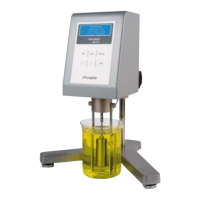11. Important Rheological Information
To obtain precise results it is necessary to know the most important rheological properties of the sample.
Newtonian fluids
The viscosity of these fluids does not depend on the shear rate meaning that at any speed the viscosity is the
same. Only temperature affects the viscosity; changes of 1ºC can provoke a change in the viscosity of up to
10%.
Non-Newtonian fluids
The viscosity of this type of products changes with the speed variable. Due to this inconsistency, the term
Apparent Viscosity is habitually used.
Within the classification you can find two different groups:
Time-independent non-Newtonian fluids
Time-dependent Newtonian fluids
Time-independent non-Newtonian fluids
The viscosity of a time-independent non-Newtonian fluid depends on the temperature and the speed
gradient.
Pseudo plastic Fluids:
The viscosity diminishes when the speed gradient increases.
Practical examples: paints, shampoos, fruit juice concentrate, adhesives, polymers, grease, starch,
etc.
Dilatants-Fluids:
The viscosity increases with the speed gradient.
Practical examples: clay, sweets components, etc.
Plastic Fluids:
These fluids only start to flow after having been submitted to a certain force (shearing force). They
behave like solids in static conditions.
Practical example: Ketchup.
Time-dependent non-Newtonian fluids.
The viscosity of time-dependent non-Newtonian fluids is dependent on the temperature, on the speed
gradient and on time.
Tixotropical fluids:
In these substances the viscosity diminishes with time when the fluid is subjected to a constant
speed gradient. These substances tend to return to their previous viscosity once the speed gradient
ceases to be applied.
Practical examples: Many products in industrial food production (yogurt, etc.)
Reopectic fluids:
In these fluids, the viscosity increases with time when the fluid is subjected to a constant speed
gradient.
These substances tend to return to their previous viscosity once the speed gradient ceases to be
applied.
These fluids are not very common.

